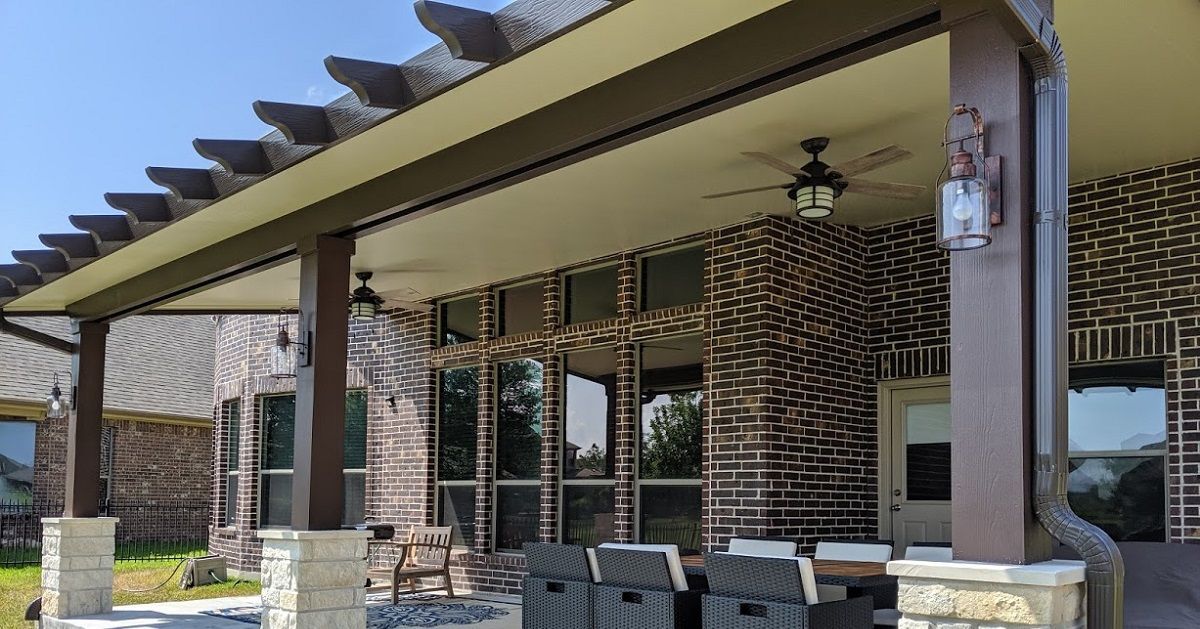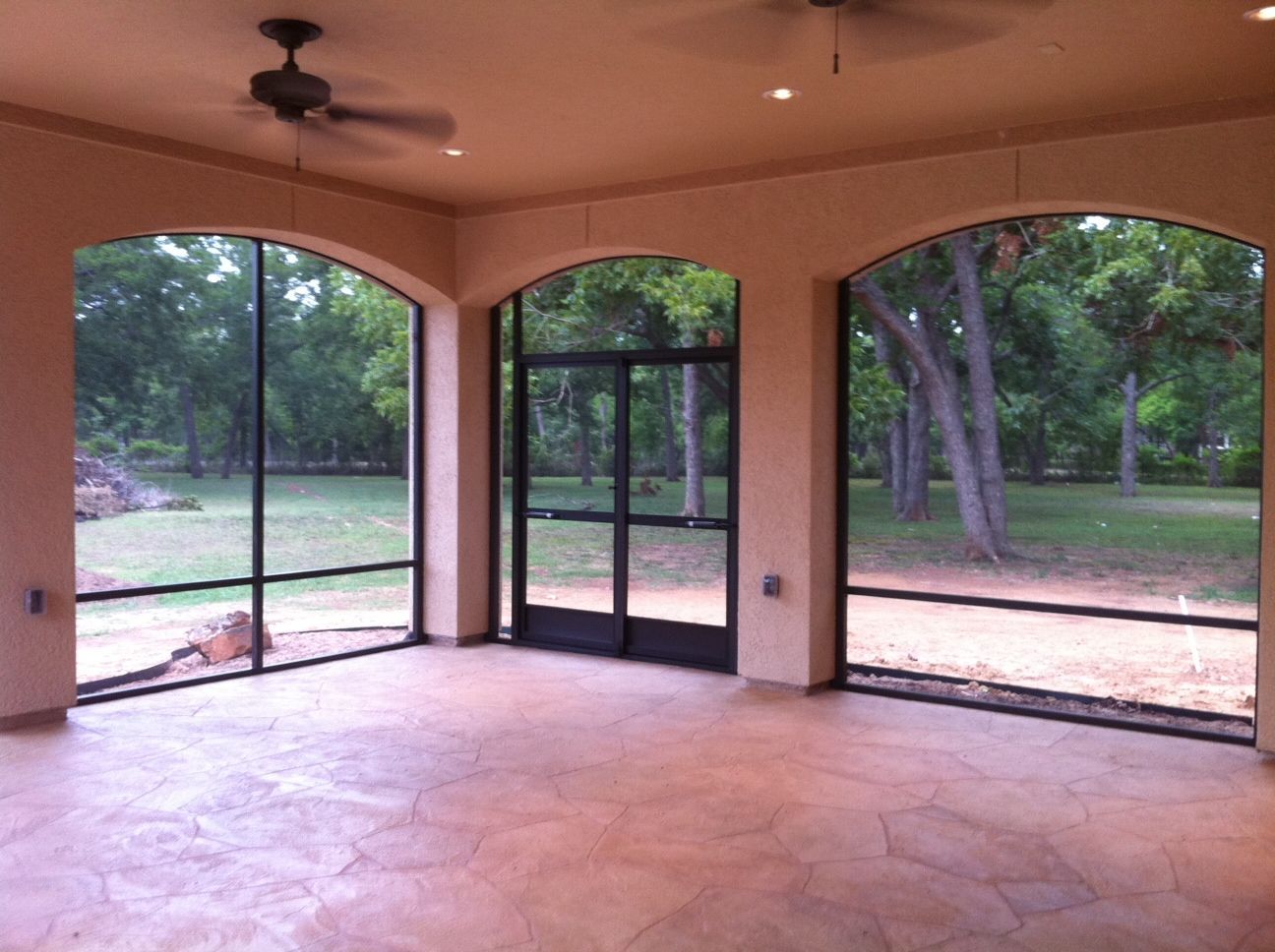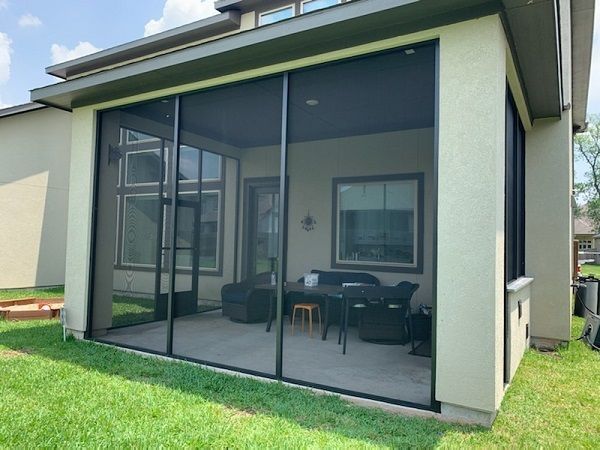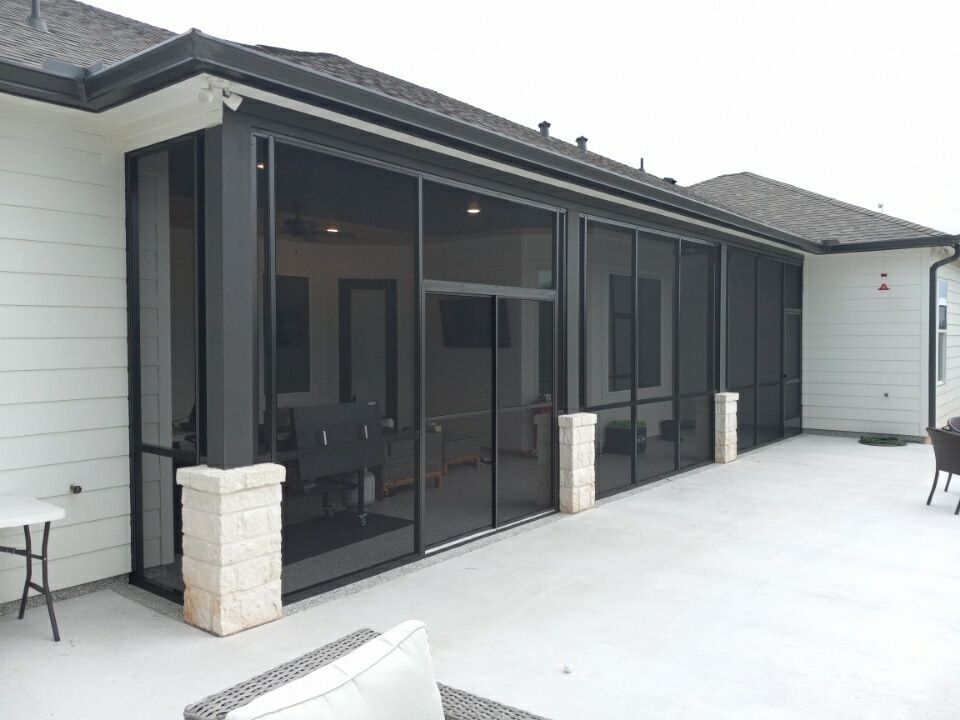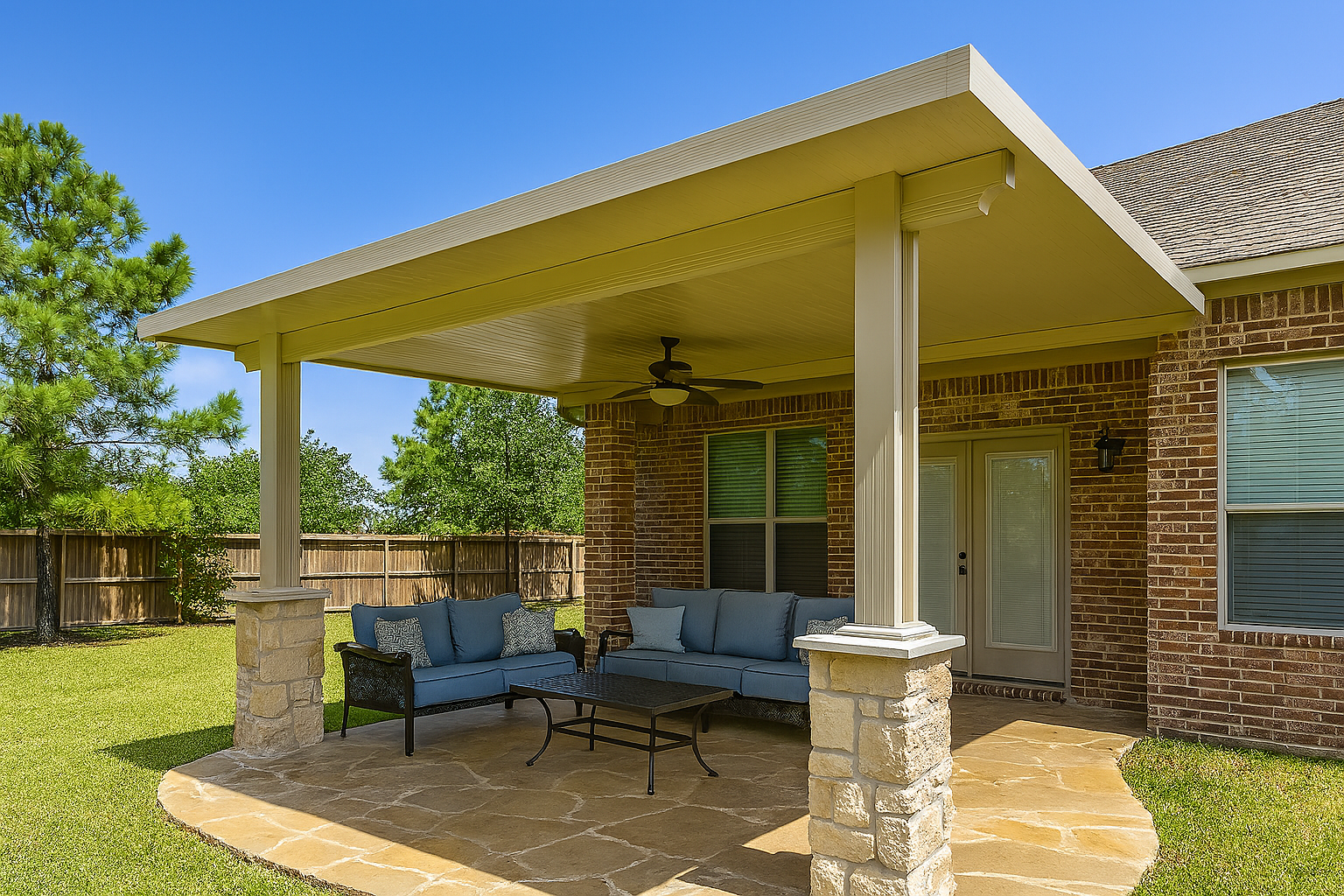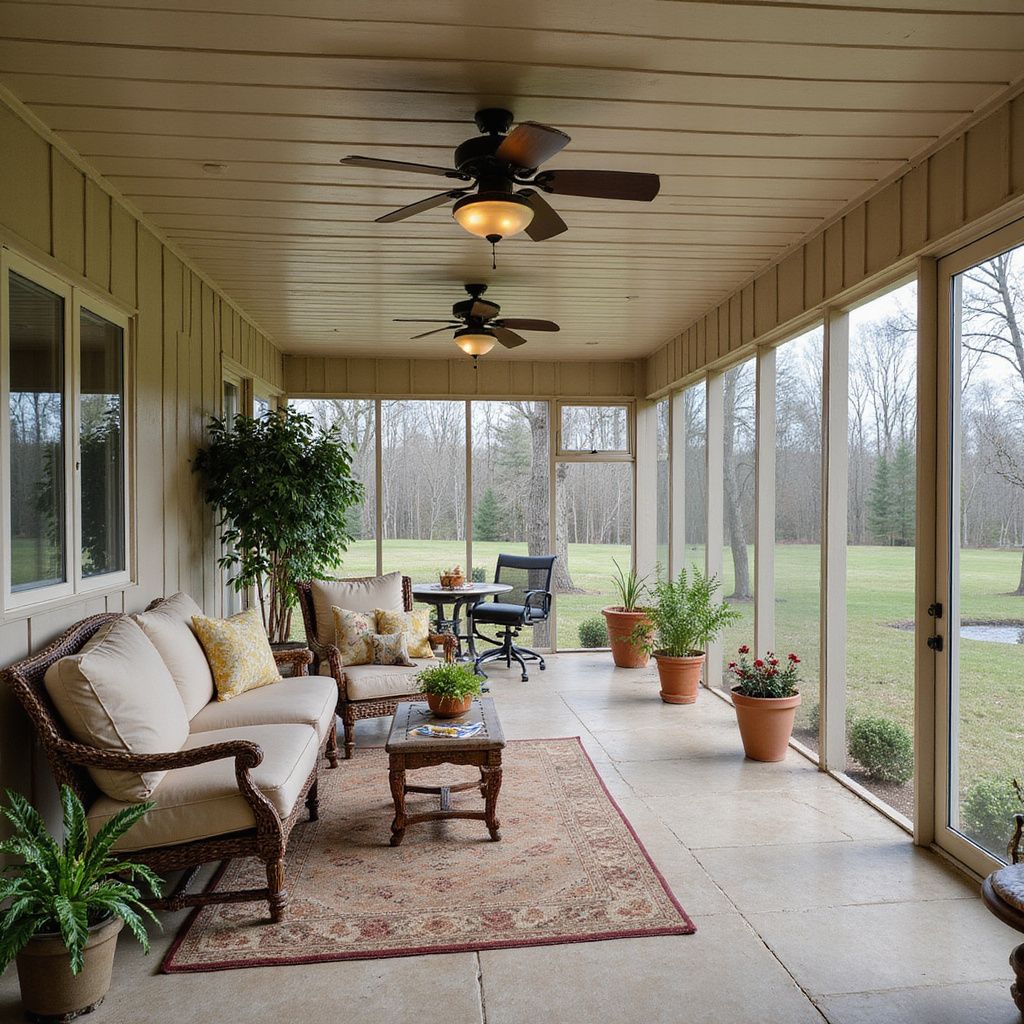Navigating HOA Approval for Your New Patio or Pergola in the Houston Area
Get a Free Quote
Lone Star Patio Builders designs and builds custom outdoor living spaces across Houston, Katy, Cypress, Sugar Land, The Woodlands, and surrounding areas. With over 30 years of experience, we’re trusted patio builders who specialize in high-quality, HOA-compliant structures — including patio covers, pergolas, screen rooms, and enclosures. Whether you’re upgrading your backyard for entertaining or adding shade and comfort, we deliver craftsmanship that lasts.
Our Services:
Elegant and Functional Pergolas
Add elegance and shade to your backyard with our beautifully crafted pergolas. Perfect for creating a relaxing outdoor retreat.
Bug-Free Screened Porches & Patios
Enjoy the outdoors without the hassle of bugs and debris. Our screened in porches provide a comfortable and clean outdoor living area.
Enhancing your outdoor living space with a new patio cover, pergola or, screen enclosure in Houston can be an exciting project, yet it involves navigating through the requirements set by your Homeowners Association (HOA). In the Houston area, these regulations can be particularly complex and varied, presenting a challenge for homeowners eager to start their renovations. This guide aims to clarify the HOA approval process, providing you with the knowledge needed to ensure a seamless experience as you embark on your outdoor renovation project.
Understanding the HOA Approval Process
Before you begin construction on your patio or pergola, it's crucial to understand the HOA approval process, which can be intricate and time-consuming. Each HOA operates under its own set of rules and regulations, making it essential for homeowners to familiarize themselves with these guidelines to avoid unnecessary delays or complications. A thorough understanding of the process not only helps in complying with the regulations but also in anticipating the time and resources needed.
Why Do HOAs Require Approval?
HOAs are integral to maintaining the aesthetic and functional integrity of a neighborhood. By regulating changes to properties, HOAs ensure that all modifications align with the community's standards and guidelines, preserving the uniformity and appeal of the neighborhood. This regulatory framework helps in safeguarding property values while fostering a harmonious environment where all residents can enjoy a cohesive community ambiance. Additionally, HOAs serve to prevent conflicts between neighbors by establishing clear rules on property modifications.
Key Steps in the Approval Process
- Review HOA Documents: Begin by thoroughly reviewing your HOA's governing documents, commonly referred to as CC&Rs (Covenants, Conditions, and Restrictions). These documents provide a comprehensive overview of the rules you need to follow and specify which types of property modifications require prior approval. Understanding these documents is crucial, as they form the foundation of your proposal.
- Submit a Proposal: Most HOAs demand a formal proposal for any significant property changes. Your proposal should be detailed, including plans, sketches, and specifications of your intended patio or pergola project. It’s important to ensure that your proposal is both comprehensive and clear, as this will facilitate a smoother review process by the HOA board.
- Wait for Approval: Once your proposal is submitted, the HOA board will take time to review it. This process can be lengthy, ranging from several weeks to a couple of months, depending on the complexity of your project and the board’s schedule. Planning your project timeline around this potential delay can help in managing expectations and scheduling contractors effectively.
- Respond to Feedback: Be prepared to make necessary adjustments to your plans based on feedback from the HOA. This may involve altering materials, colors, or the overall design to meet the community standards. Flexibility and openness to suggestions can often lead to a more favorable and expedient approval process.
- Receive Approval: Once your proposal is approved, you will receive written confirmation from the HOA. This documentation is essential, as it provides official permission to proceed with your project. Keep this approval handy throughout the construction process to avoid any disputes or issues that may arise.
What to Include in Your Proposal
Crafting a thorough and accurate proposal is key to increasing the likelihood of approval from your HOA. A well-prepared proposal not only demonstrates your commitment but also provides the HOA with a clear understanding of your project’s impact on the community.
- Detailed Drawings: Provide clear and precise architectural drawings or sketches of your proposed covered patio or pergola in Houston, TX. Include dimensions, materials, and colors to give the HOA a comprehensive view of your project. These drawings should be professionally prepared, if possible, to enhance clarity and detail.
- Material Samples: Whenever possible, include samples or photographs of the materials you plan to use. This visual aid helps the HOA visualize how your project will integrate with the existing community aesthetics. Providing samples also aids in addressing any concerns regarding the quality and appearance of the materials.
- Project Timeline: Outline a realistic timeline for the project, including start and completion dates. This demonstrates your commitment to finishing the project promptly and allows the HOA to anticipate any disruptions. A detailed timeline can also assist in scheduling contractors and managing project logistics.
- Contractor Information: If you're hiring a contractor, include their contact information and credentials. This reassures the HOA that your project will be professionally managed and executed. Providing contractor details can also expedite the approval process by showcasing the expertise and reliability of your project team.
Common Challenges and How to Overcome Them
- Delays in Approval: Be patient and allow ample time for the review process. It's important to follow up politely if you haven't received a response within the expected timeframe. Regular communication can help in keeping your project on the HOA’s radar and prevent it from being overlooked.
- Requests for Modifications: Be open to making adjustments to your plans. Flexibility can often lead to a quicker approval process and demonstrate your willingness to cooperate with HOA guidelines. Consider engaging in a dialogue with the HOA to understand their concerns and collaboratively find a resolution.
- Rejection of Proposal: If your proposal is rejected, don't be discouraged. Request specific feedback from the HOA and make the necessary changes before resubmitting. Understanding the reasons behind the rejection can provide valuable insights for refining your proposal and improving its chances of approval.
Specific Considerations for Houston Area HOAs
The Houston area is characterized by its diverse communities, each governed by unique HOA regulations. Understanding these specifics is crucial for successfully navigating the approval process.
Climate and Environmental Factors
Houston's climate can significantly influence HOA regulations, particularly concerning materials and structural designs. For instance, pergolas may need to be constructed with materials that can withstand high humidity and intense sunlight, common in the region. Selecting weather-resistant materials not only ensures compliance with HOA guidelines but also enhances the longevity of your project.
Do Screen Rooms Need HOA Approval in Houston?
Many homeowners in Houston wonder whether building a new screen room in Katy requires HOA approval. The answer depends largely on your specific community guidelines. In some neighborhoods in Houston, a screened porch might be considered a significant structural modification, necessitating approval. Always verify with your HOA to ensure compliance and avoid potential conflicts.
Local Building Codes
In addition to adhering to HOA guidelines, it is imperative to comply with local building codes and permits. Ensuring your shade project aligns with Houston's zoning laws and construction regulations is crucial to avoid legal complications. Consulting with local authorities or a professional can provide clarity on these requirements and help streamline the approval process.
Final Thoughts
Navigating the HOA approval process in the Houston area requires diligent planning and patience. By understanding the necessary steps and preparing a comprehensive proposal, you can significantly increase the likelihood of a successful outcome. Whether you're adding a patio, pergola, or contemplating planting palm trees, always consult your HOA documents and maintain open communication with the board. This proactive approach will not only facilitate a smoother approval process but also help you enjoy your new outdoor space without unnecessary setbacks.
With the right preparation and a clear understanding of your HOA's requirements, you can transform your backyard into a beautiful oasis that enhances both your home and community. By aligning your project with community standards and adhering to local regulations, you'll create a harmonious and aesthetically pleasing addition to your outdoor living space.
Lone Star Patio Builders in Houston, TX can guide you through the entire process.
Ready to Build Your Dream Patio?
Call
(281) 773-1255 or request a free quote online. We’ll schedule a no-obligation consultation at your home and walk you through every step — from design to final inspection.
